
While international travel has now started to open up, the various travel restrictions put in place during the COVID pandemic mean that some individuals found themselves stranded either in or outside the UK. This has a number of potential implications for tax.
In this article, we outline the importance of UK residence for tax purposes – what this means for income tax, property and trusts.
The SRT looks at a combination of days spent in the UK in a particular tax year and the number of “ties” to the UK an individual has (accommodation, family, working days etc) in order to determine the maximum number of days that individual can spend in the UK without triggering UK residence. Finding oneself inadvertently present in the UK might mean that the maximum number of days is exceeded, or it could turn an “arrive” into a “leaver” when applying the “sufficient ties” test.
In some cases, a day can be considered as “exceptional” and therefore disregarded from the day count and HMRC did issue some guidance as to when days spent in the UK due to COVID can be considered “exceptional” for these purposes. These include situations where an individual:
In all cases, the individual must show that their presence in the UK is beyond their control and that they have made every effort to leave the UK once restrictions permit.
While the guidance is welcome, the sting in the tail is that, with the exception of some care, health and scientific professionals, the limit for “exceptional circumstances” remains capped at 60 days irrespective of the number of days which were spent in the UK that were completely outside the control of the taxpayer!
For more information or if you would like to discuss your specific circumstances, please get in touch.
We’d love to hear from you. To book an appointment or to find out more about our services: